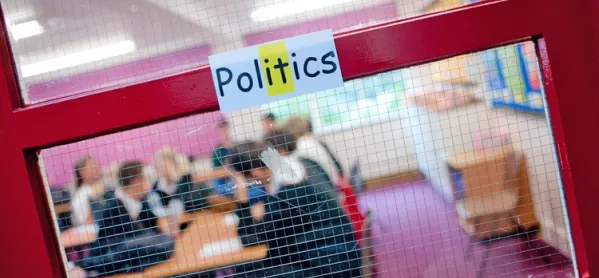If there’s one lesson to be learned from political events since last year, it is that politics is a messy business.
This is not necessarily a bad thing - belief, values, intuitions and feelings play a far more important part in politics as lived experience than in the business of knowledge and deliberative reasoning. Of course, knowledge and logical reasons are important, but they are important in publicly justifying, not supplanting the place of, broader politico-ethical commitments.
Politics is as much about persuasion as winning a logical argument. So, where does this leave schools and teachers who aim to prepare the next generation for future citizenship in its broadest sense? If we sanction teachers to teach politics, how can we know they will not, inadvertently or not, impose their own biases?
In the Electoral Reform Society’s report It’s Good to Talk, published soon after the EU referendum last year, the authors propose extending citizenship education along with lowering the vote to 16 years of age. These initiatives, they claim, would “lay the groundwork for a more informed and engaged electorate better equipped to deliberate on the issues around a referendum”. It all sounds so logical; who could object? But look closer. On the issues around a referendum? The use of the indefinite article is revealing: it’s what we use when the specifics do not matter. And in politics, as in life, the specifics are all. We do not usually say, for example, “I’ve met a person of my dreams” as if any old person would do; we don’t just go and vote in any old referendum or election either, for that matter.
The ERS is not the first to try and resolve political problems through education.
In 1998, after decades of increasingly technocratic forms of governance, the decreasing electoral turnout, especially among the youth vote, was a source of anxiety among sections of the political class. The government commissioned a report led by Bernard Crick, Education for Citizenship and the Teaching of Democracy in Schools, which paved the way for the introduction of compulsory citizenship lessons in 2002. Crick was right to be concerned about declining public trust in political institutions, he was wrong to think this was the product of deficient education or a lack of ethical commitment on the part of the young as some argued at the time. Primarily, it was a product of deficient political ideas and practices within the political elites themselves, as has subsequently become clear. As adult citizens, we cannot expect teachers to teach us out of these very important adult problems without risking either indoctrination and distortion of the curriculum, or both.
This does not mean, however, that politics need be a no-go area for schools.
Educational sociologist, John Beck, makes an important distinction between teaching about citizenship and teaching for citizenship.[1] The former requires that experience and knowledge of politics from our life experience are re-contextualised as disciplinary knowledge. History, sociology, cultural studies, philosophy, as well as established politics courses could be drawn on to construct an intellectually and imaginatively rich syllabus for educational purposes.
It would mean the adult educators involved temporarily putting aside their own political commitments, and prioritising their epistemic commitment to truth and truthful knowledge rather than aiming to achieve their own particular political goals by any means necessary. Using institutional authority to teach the young that they need to be intellectually equipped to participate in any aspect of political life is to cross the line from teaching about, to teaching for, citizenship. It also crosses the line between education and indoctrination.
Dr Alka Sehgal-Cuthbert is an education researcher, writer and teacher
Want to keep up with the latest education news and opinion? Follow Tes on Twitter and Instagram, and like Tes on Facebook.
[1] Morality and Citizenship in Education, 1998, Bloomsbury Publishing.
